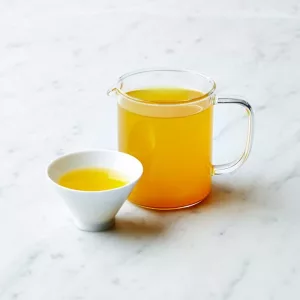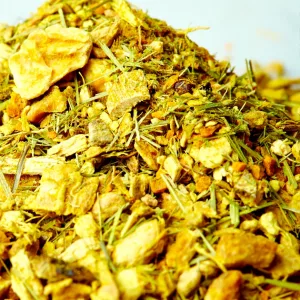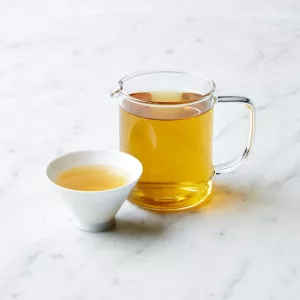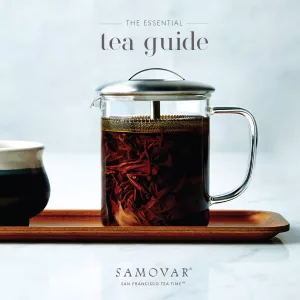 Last spring Samovar Ambassador Lindsey Goodwin visited our friend Ayumi Kinezuka, organic tea farmer in Shizuoka, Japan. Here, Lindsey shares her experiences and the impact of participating in an annual tea festival held by Ayumi’s farming community:
Last spring Samovar Ambassador Lindsey Goodwin visited our friend Ayumi Kinezuka, organic tea farmer in Shizuoka, Japan. Here, Lindsey shares her experiences and the impact of participating in an annual tea festival held by Ayumi’s farming community:
In May, I visited some friends of Samovar – a family of tea producers with connections to the Bay Area – in the mountains of Shizuoka, Japan. During my time there, I sampled seasonal delicacies, participated in a “tea festival” and sensed community and peace through tea.
It was a deeply meaningful experience to me as a tea-loving foodie, but it has far broader implications surrounding human interconnection, connection to the land and the significance of good tea and good food.
Before the Tea Festival
I arrived in Shizuoka at nightfall, jetlagged and wary. Ayumi Kinezuka, the daughter of a local organic tea cooperative’s founder, met me at the train station just outside of a Russian restaurant called (you guessed it) Samovar. Immediately, Ayumi came across as warm, driven and down to earth.

As we rode high into the mountains of Shizuoka discussing food politics with two other passengers (both agriculture grad students at a university just outside Tokyo), it was clear that I would learn about far more than tea during this visit. I was being immersed in a larger movement that mirrors the Bay Area’s own food movement in some ways, yet is distinctly tied to Japanese traditions.
The morning after my arrival, I awoke before dawn. For the first time, I experienced the striking beauty of lush, mountainous Shizuoka. Outside my bedroom window, there were fruit trees and rice fields. The sounds of a swift-moving stream wafted up the hillside and mingled with the calls of wild birds. In the distance, there were mountains covered in emerald and blue-green swaths of tea plants and evergreens.
Soon, I found myself in a Jeep on a dizzying dirt road with Ayumi and the Kinezuka family dog (a fellow foodie who taught himself to peel mikan – oranges – with his paws). Ayumi told me stories of her time studying psychology at UC Berkeley. In California, she noticed how disconnected from nature people can become. During a visit home, she realized that she could live harmoniously with nature and help city dwellers experience its beauty (even if only for a few days at a time) by holding tea festivals. This epiphany prompted her to return to the agrarian lifestyle – a rare decision amongst the younger generation of Japanese farming families.
Sounding a bit like the tea world’s version of Severine von Tscharner Fleming or Ann Cooper, she talked about the importance of building a community amongst young farmers and helping young people get back to the farm, both in terms of food production and consumption.
We climbed out of the Jeep and began harvesting wild herbs on a mountainside as we talked. Some of the herbs were familiar to me (such as tampopo – dandelion), while others (yomogi, taranome, warabi fuki) were not. The harvesting was not laborious work, but it did require that we traverse muddy slopes and stand on precarious ledges, reaching for the newest leaves and freshest herbs with a pair of clippers attached to a long extension handle.

“You can’t find these in the cities,” Ayumi said. She explained that part of her goal in promoting organic farming is to expose people to wild-harvested, local and seasonal foods that are not to be found in grocery stores, or are only available if mass-produced into flavorlessness.
Good food is certainly important for humankind, but another part of Ayumi’s goal is even more essential to the human experience – it is to help people experience joy through a connection to the land. Combining her experience with farming and psychology, Ayumi noted that when people (especially children) are in nature, they are happier; they forget about the stresses of city life and get back to the basics of human activity and connection.
In a blend of optimism and pragmatism that I noticed again and again in discussions with Ayumi, she was also quick to point out that the farming cooperative was not simply holding tea festivals for altruistic purposes. She said their goal as a group is to build strong relationships with whoever drinks their tea, so loyal customers can reap the benefits of good harvest years and continue to support the farmers through leaner years. In experiencing the rural lifestyle, customers can see the true worth of tea – a product they might otherwise take for granted.
After we harvested wild herbs, Ayumi took me to an organic farmers cooperative meeting. They were working out the final details of the event and, although I understood almost nothing they said, I could tell from their speech and body language that it was an issue close to the hearts of the farmers. Ayumi later explained that their cooperative is a “protest” against the usual means of tea farming and tea selling in Japan, and that their festivals (which are held several times a year) are a means of educating and connecting with consumers. Whereas most Japanese farmers use chemicals to produce tea and have many buyers between themselves and their customers in the supply chain, this cooperative is strictly organic and typically sells directly to consumers and retailers.
On the way to clean a formerly abandoned house (a common sight in some areas of rural Japan), we passed a number of abandoned tea fields. The abandoned plants were often as tall as wild Chinese tea trees, but they looked wiry and weak. Because they were bush-style tea plants, they lacked the core trunk that supports tree-style tea plants, and the more they grew, the less healthy they became. Ayumi told me that abandoned tea bushes begin to choke out the sunlight they need to thrive after a few years of growing untended, and that many of the overgrown plants I saw would need to be torn out and replaced before the land could be farmed again. Although it was a devastating reminder of the flight of young people out of farmland and into the cities, Ayumi remained positive – getting young people interested in farming was, after all, part of the intention of the tea farmers’ festival.

Tea Festival: Day One
After the herbs had been harvested, the women of the group had skillfully prepared a portion of the food and the once-abandoned house had been cleaned for visitors, the farmers were ready to begin the festival. Crowds arrived from the train station crammed in trucks and vans. There were small children, grad students, elderly women and everyone in between. Most were from cities, and some were from other rural areas, but all of the visitors were in search of connections to nature and to other people.
There was no shortage of things to do over the next few hours. In informal workshops, groups learned to make soba noodles from scratch and to make sencha by hand. Children played gleefully outdoors and then moved to the porch to avoid the off-and-on drizzling rain. Laughter and tempting aromas emanated from the kitchen, where a group of women bonded as they cooked. Outside under a tent, some of the men roasted a wild boar, which they would later chop up, blend with rice and vegetables, stuff into bamboo stalks, and then smoke over a large grill.
Before it was time to eat, I was scheduled to give a speech. The group politely gathered, and I talked about the growing American interests in tea in general, Japanese food culture and Japanese green tea in particular. Afterward, people asked lots of questions about the availability of quality green tea in America (which I said was on the rise) and American habits of adding milk and sugar to green tea (which I said was declining, but sometimes delicious – after all, matcha lattes are enjoyed in Japan, too!).
Then, finally, it was time for the feast. As a cornucopia of foods was laid out on long, communal tables and lively conversations swelled amongst the group, it became abundantly clear why people had traveled from far and wide to attend. Over bamboo-roasted sake, tempura-fried herbs, homemade miso soup, bamboo rice, free-range chicken, sencha, and other traditional, seasonal and hyper-local delicacies, people let go of the usual inhibitions associated with polite Japanese conversation. There were introductions all around, complete with a microphone. People asked many questions of the foreigners in the group, including a few about international politics, sexual/dating mores and the like that were more than a little taboo.
Late into the night, people talked about food and food politics, love and life, and cultural differences and overlaps. With the help of a few translators, I found myself bonding with a charming older woman who owned a small tea farm near Tokyo, a businessman with a good sense of humor and many questions about American business customs, and an international crew of students and teachers. Despite the size of the group, which neared 100 people, it was an intimate gathering that fostered spontaneous and sincere interactions. The tea, the food and the sake were the obvious spoils of the event, but they were also the catalysts for what made it so successful year after year – the human connections formed there.
Tea Festival: Day Two
On the second day of the tea festival, the weather abruptly shifted from dreary to bright and sunny. Over koucha (black tea) that was processed in the Kinezukas’ factory, Ayumi told me that abrupt weather changes were a recent phenomenon, and a sign of climate change. However, I can’t profess to have minded much at the time – the sound of the wind in the trees and the frogs alongside the nearby stream, the sight of the steam rising off of the Kinezukas’ rice paddies and the feel of the warm morning sun on my skin was one of the most tranquil and beautiful moments I have yet to experience.

Many of us took turns smashing rice into mochi with a mallet – some muddled with fresh tealeaves and some muddled with small oranges, some rolled in azuki (sweet red beans) and some rolled in kinako (savory-sweet soybean powder). After an appetizer of mochi, we sat at the communal tables once again and supped on a breakfast of miso, rice and raw egg (which locals say is safe because it is unpasteurized and, thus, protected by its intact “good bacteria”).
Full from the morning meal, we hopped into Jeeps for a hike up a mountainside. After a steep ascent by car and a steeper ascent by foot, we reached one of the many organic farms that were interspersed amongst dense forests. There, we plucked leaves from the Yakibuta (“North of the Bamboo Forest”) varietal of tea plant that is common in Japan. As we harvested, I talked with an elderly farmer whose children had given up on farming, as well as a young woman who lived in Tokyo and wanted to move to the countryside.
After some time, we collected our leaves inside a sheet and sat down on thick quilts for a bento picnic. As people chatted, I realized why every one of us was smiling – for two days, all we had done was prepare and eat food, drink tea and sake, experience nature and connect with other people. With no cell phones, WiFi or deadlines to distract us, we could let go of the stresses of daily life and to get back to some of the things that truly bring us joy.
During the hike back down to the Jeeps, I chatted with a Tokyo-based architecture student from Brazil and an organic farmer/macrobiotic chef/laughter yoga instructor from Tokyo. It dawned on me that a few passionate advocates for tea and organic farming had brought together an unlikely group of people with this event, and that each attendee would leave with a newfound perspective on tea, traditional food culture and organic food production. Then, rather suddenly, it was time to leave. We rode back to the formerly abandoned house in which we had shared meals together, and then people left in small groups, returning to cities and to other farms.
Sharing the Festival With the World
In the days following the event, I rode horseback with Ayumi’s brother, picked strawberries with Ayumi and her sister, harvested wild bamboo shoots at dawn, interviewed tea producers, visited a local tea museum and ate one of the most fantastic meals I’ve ever tasted.
However, the most vibrant memory of my visit to the farm is the sense of community surrounding the tea festival. A week after leaving Shizuoka, I met with two other attendees of the tea festival in Tokyo, and it seemed that each had carried his experiences of the event into the world in a different way.
It is my hope that by sharing this experience, I can convey the strength of Ayumi’s vision of societal wellness through a connection to the land and the most basic of human endeavors – partaking in the simple joys of nature, good company and good food.
Learn more about Ayumi Kinezuka and the Organic Tea Coop
Learn about Ayumi’s Japanese Black Tea





